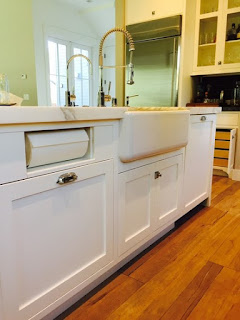8 Steps to Surviving a Kitchen Remodel
 Congratulations — the kitchen remodeling job you've planned for
months is finally ready to begin! Now comes the hard part: making do without a
fully functioning kitchen for the duration. There's no escaping the
inconvenience, but with some smart planning, it doesn't have to wreak havoc on
your household. Follow these tips to make the construction process as smooth as possible.
Congratulations — the kitchen remodeling job you've planned for
months is finally ready to begin! Now comes the hard part: making do without a
fully functioning kitchen for the duration. There's no escaping the
inconvenience, but with some smart planning, it doesn't have to wreak havoc on
your household. Follow these tips to make the construction process as smooth as possible.  1. Designate a kitchen stand-in. Eating out all the time gets tiresome, not to
mention the strain it can put on your budget. And no matter how much takeout
you bring home, you'll still need a spot to make school lunches, pour a bowl of
cereal or brew coffee. Set up a temporary kitchen somewhere that's out of the
way of construction.
1. Designate a kitchen stand-in. Eating out all the time gets tiresome, not to
mention the strain it can put on your budget. And no matter how much takeout
you bring home, you'll still need a spot to make school lunches, pour a bowl of
cereal or brew coffee. Set up a temporary kitchen somewhere that's out of the
way of construction. If you're lucky enough to have a morning kitchen or a guesthouse, you can turn that into food-prep central. Or outfit a corner of the basement, garage or workroom with a few portable tables, standalone shelves, storage crates and folding chairs.

Keep things simple and pare down to the kitchen tools you really, truly can't live without. Be merciless — how often are you going to use your food processor or waffle iron? Stash the essentials close at hand and store the rest.
 3. Plan meals around small appliances. Portable workhorses such as slow cookers,
microwaves, toaster ovens, electric griddles and skillets, hot plates and
coffee makers can get you over the mealtime hump.
3. Plan meals around small appliances. Portable workhorses such as slow cookers,
microwaves, toaster ovens, electric griddles and skillets, hot plates and
coffee makers can get you over the mealtime hump. Move your fridge to your temporary kitchen, if possible; if not, invest in a minifridge and a chest freezer or borrow them from a friend.
4. Stock the pantry with disposables. Without your usual spot to wash dishes, you'll be getting creative (the bathtub, an outdoor hose, a cooler full of sudsy water).
Make life easier by stocking up on recyclable or biodegradable plates, napkins, cups and utensils. You'll streamline cleanup and cut down on the stress of your temporary displacement.
5. If the weather
cooperates, put your grill to work. Here's a secret: Your grill can do almost anything your oven
can. Need to roast meat or vegetables, or bake pizza? Look to the grill. You
can even channel your Scout days and use it for foil-packet meals, pans of
biscuits and rolls, skillet pies and cobblers and, of course, s'mores.

6. Keep a stash of nonperishable snacks. When you're starving but can't face putting together a full meal in your makeshift digs, snacks can save your stomach.
Peanut butter, crackers, dried fruit or fruit leather, canned goods, trail mix and more can make for quick meals in a pinch.
7. Leave town for a short time, if you can. If you're considering a vacation or need to
schedule a business trip, now might be a good time, assuming you're comfortable
with the remodeling work continuing in your absence. Bonus points if you're
visiting relatives — you might score a home-cooked meal or two.
 8. Remember the big picture. In the grand scheme of homeownership, this is but a short
period of inconvenience amid years of kitchen bliss. Keep the process in
perspective and treat it as an adventure. When you're hard at work in your
sparkling new kitchen, the temporary hassles will fade from memory.
8. Remember the big picture. In the grand scheme of homeownership, this is but a short
period of inconvenience amid years of kitchen bliss. Keep the process in
perspective and treat it as an adventure. When you're hard at work in your
sparkling new kitchen, the temporary hassles will fade from memory.


ReplyDeleteThis post offers really practical and helpful advice for anyone about to start a remodeling project. Remodeling can definitely be stressful, but following these steps can make the process much smoother and more manageable. From communication and planning to patience and flexibility, these tips cover everything homeowners need to know to survive—and even enjoy—the journey. For those seeking professional support during their remodel, I highly recommend r4remodelers. Their experienced team provides expert craftsmanship and excellent customer service to help ensure a positive remodeling experience. This article is a great resource for preparing yourself and your home for a successful renovation!